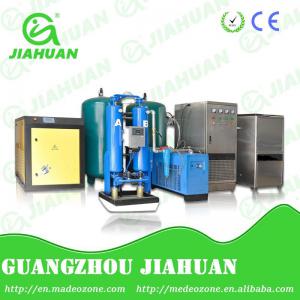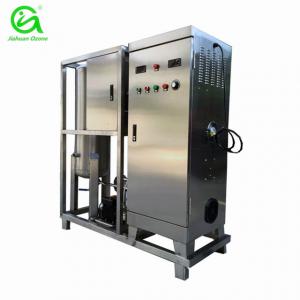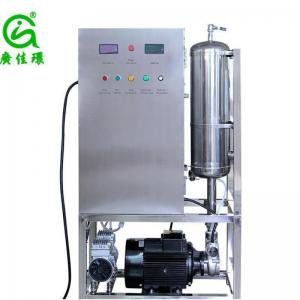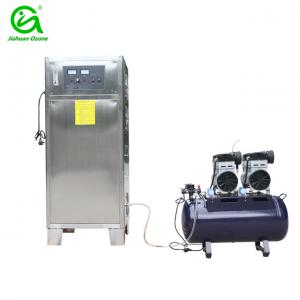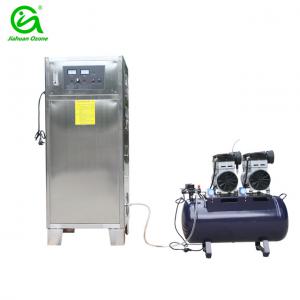1. product details:




2. Product's parameter :
| No | Name | Model/Parameter | Quantity | Brand | Remarks |
| 1 | 1 KG/H Ozone System | 1 set | |||
| 1.1 | Ozone Electric Box | YT-025-1kg | 1 set | Jiahuan | outer |
| 1.2 | Oxygen Generator | ZL-200L | 1 set | Jiahuan | outer |
| 1.3 | Ozone discharge chamber | 1 set | Jiahuan | outer | |
| 1.4 | Electronic flowmeter | 1 set | Jiahuan | Built-in | |
| 1.5 | Gas flowmeter | 1 set | Jiahuan | Built-in | |
| 1.6 | Apparatus | 1 set | Jiahuan | Built-in | |
| 1.7 | Gas pressure regulating valve | 1 set | Jiahuan | Built-in | |
| 1.8 | Temperature controller | 1 set | Jiahuan | inset | |
| 1.9 | Pressure control vale | 1 set | Jiahuan | inset | |
| 1.10 | Electromagnetic valve | 1 set | Jiahuan | inset | |
| 2 | Air source treatment equipment | Standard configuration | |||
| 2.1 | screw air compressor | Power:22KW,Air flow rate:3.8m3/min , 380v/50hz | 1 set | Other | outer |
| 2.2 | Freeze drier | HMR-30P 0.55kw,37kg,220v/50hz | 1 set | Other | outer |
| 2.3 | Adsorption type air drier | GJH-30p 0.5kw 150kg 220v/50hz | 1 set | Other | outer |
| 2.4 | Filter | P,Q,S,C grace | 1 set | Other | outer |
| 2.5 | Air storage tank | 1.0m³*2 | 1 set | Other | outer |
3.ozone application of dye wastewater :
Studay shows that ozonation process was used for decolorization of five commercial reactive dyes (Remazol Brilliant Red 3BS-A 150%, Remazol Yellow 3R-SA 133%, Remazol Blue R Special, Remazol Turquoise G 133% and Remazol Brilliant Blue BB), having various chromophore groups (monoazo, anthraquinone, phthalocyanine, formazan copper complex). The aim of the study was to examine in detail the effect of the major system parameters on the decolorization efficiency of ozone and to compare the effectiveness of ozone in decolorization of reactive dye effluents depending on the dye chromophore. The parameters, which were examined separately, are the solution pH and the ozonation time. Ozonation process was carried out in batch system and the ozone production rate was 1000g/h. In the study, it was found that color removal efficiencies, depending on the dye chromophore, vary from 83% to 96% and 34% to 93% in the ozonation processes carried out with and without pH adjustment, respectively. Furthermore, according to the experimental results, it can be concluded that the ozonation process could be effectively used in decolorization of reactive dyes especially having copper formazan and anthraquinone chromophores.
4. Ozone Benefits for Wastewater Treatment
- More effective than chlorine in destroying viruses and bacteria
- Utilizes a short contact time
- No harmful residuals that need to be removed after ozonation because ozone decomposes rapidly
- No regrowth of microorganisms, except for those protected by the particulates in the wastewater stream
- Generated onsite, and thus, there are fewer safety problems associated with shipping and handling
- Elevates the dissolved oxygen (DO) concentration of the effluent
- Can eliminate the need for reaeration and also raise the level of DO in the receiving stream
- Clean, safe, and reliable, taking up less space, and less equipment than many chemical treatment/storage systems
- Saves money by eliminating on-going chemical costs
- Destroys all bacteria without a preference to one type of organism. Ozone will also remove some BOD, COD, and many other contaminates in the wastewater stream.
- Filtration will not be necessary after ozone disinfection
- Fewer secondary by-products like trihalomethones (THM) are formed with the use of ozone
- Ozone is most effective, however, by either eliminating or significantly reducing precursors in the raw water responsible for THM formation.
- Oxidation of odor causing compounds in the water may also be a secondary effect of ozone use in wastewater
- Odor control may be completed during the disinfection process
- Micro-pollutant removal and eliminates the need to add processes in the treatment stream with future regulation
1. The principle of ozone sterilization
Ozone (O3) is an allotrope of oxygen. It is a light blue gas with a special odor. Its molecular structure is triangular, with a bond angle of 116°, its density is 1.5 times that of oxygen, and its solubility in water is 10 times that of oxygen. Ozone is a strong oxidant, its redox potential in water is 2.07V, second only to fluorine (2.5V), its oxidation capacity is higher than that of chlorine (1.36V) and chlorine dioxide (1.5V), and it can destroy the decomposing bacteria. The cell wall quickly diffuses into the cell, oxidatively decomposes the glucose oxidase necessary for oxidizing glucose inside the bacteria, and can also directly interact with bacteria and viruses to destroy cells, RNA, and decompose DNA ( Polymers such as DNA, RNA, proteins, lipids, and polysaccharides destroy the metabolic and reproductive processes of bacteria. The killing of bacteria by ozone is caused by the disruption of the cell membrane. This process is called cell dissociation because the cytoplasm is comminuted in water and cells cannot be regenerated under dissipated conditions. It should be pointed out that, unlike hypochlorous acid disinfectants, the bactericidal ability of ozone is not affected by the change of pH value and ammonia, and its bactericidal capacity is 600-3000 times larger than that of chlorine. Its sterilization and disinfection effects occur almost instantaneously. When the ozone concentration is 0.3-2mg/L in water, bacteria can be killed within 0.5-1min.
1 Viruses Ozone has been shown to have a very strong killing effect on viruses. For example, at a concentration of 0.05-0.45 mg/L ozone, the Poloi virus loses its activity within 2 minutes.
2 The cysts were completely removed at a concentration of 0.3 mg/L ozone for 2.4 minutes.
3 Spores Due to the protection of the spore coat, it is 10-15 times more resistant to ozone than the growing bacteria.
4 Fungi Candida albicans and penicillium can be killed.
5 Parasites Schistosoma mansoni was killed after 3 min.
2 Ozone deodorizes water bodies
The substances that generate odorduring the sewage treatment process are mainly composed of carbon, nitrogen and sulfur.
Only a few odor-producing substances are inorganic compounds such as ammonia, phosphorus, and hydrogen sulfide; most of the odor-producing substances are organic compounds such as low-molecular fatty acids, amines, aldehydes, ketones, ethers, and the like. According to the analysis of the influent status of the wastewater treatment plant where I was located, 80% of the influent water is domestic sewage, ie, the content of organic matter is very high, and the content of inorganic compounds is relatively small.
Most of the odor-producing substances are organic compounds, such as low-molecular fatty acids, amines, aldehydes, ketones, ethers, etc. These substances all have active groups, are prone to chemical reactions, are particularly easily oxidized, and have strong ozone. Oxidation characteristics, oxidation of active groups, odor disappeared, so as to achieve the principle of deodorization.
In addition to the odor removal, ozone can also prevent the re-production of odors. This is because the gas generated by the ozone generator contains a lot of oxygen or air, and the odor-producing substances are easy to cause odor in the absence of oxygen, using ozone. Treatment, oxidation and deodorization at the same time, the formation of oxygen-rich environment, can prevent the re-production of odors. The improvement of the sewage treatment environment in the urban sewage treatment plant is still relatively large.
3 Decolorization of water by ozone
With the attention paid to the tap water source environment and the reuse of secondary treatment water for sewers, secondary treatment water destaining has received attention.
As for the color and taste caused by humus, the water color averages 10 degrees. Up to 20 degrees. Such chromas rely on general cohesion sedimentation and sand filtration processes that do not achieve adequate water quality standards, and may even exceed the worst-case criteria. After the ozone treatment, the color can be reduced to less than 1 degree. The reason for the coloring of tap water is that the content of iron and manganese is too much. If these metals are in the free state, the conventional method can be fully removed. If humus is present in the raw water, chromium salts are sometimes formed and it is very difficult to perform conventional treatment. Therefore, color removal is also an important factor in the introduction of ozone treatment.
The decolorization mechanism of ozone: With the vigorous development of molecular biology, microecology will extend the ecology to the molecular level. In fact, whether the protein or nucleic acid molecule is organic, they are all composed of carbon, hydrogen, oxygen, nitrogen and phosphorus or sulfur (C, N, O, N, P, or S). At the same time, the coat of virus is composed of many The protein subunit is composed of shell particles. Each shell particle is linked by non-covalent bonds and is tangled together symmetrically. The protein is composed of multiple chains and the nucleic acid is composed of linked nucleotide chains. Of these, OH, as a whole, is electrically neutral (R-OH), but if viewed from the inside of the group, part of it has more negative charges (such as oxygen atoms) because of this part of the group. (R-OH) has "additional" bonding electrons, so it is negatively charged: the other part has more positive charges (such as hydrogen atoms), and this part of the group lacks bonding electrons, so it is positively charged. If there is another similar group close to each other, positive and negative charges attract each other to generate a weak bond, which is called a hydrogen bond, such as between polypeptide groups or between nucleotide thiol groups and DNA or RNA molecules. The thiol groups in the pair are all likely to form hydrogen bonds. Although a single hydrogen bond is very weak, many hydrogen bonds together to form a tough cell wall in plant cells. Now look at ozone, it is a strong oxidant, high oxidation potential (2.07ev). Any element with high electronegativity can strongly attract electrons, oxidize each other, and restore oneself. Oxidation results in nucleic acid breakdown, protein disintegration, antigen denaturation, negative detection, and chroma fade.
5.why choose us ?
Guangzhou jiahuan appliance technology co., ltd
Guangzhou jiahuan appliance technology co., ltd established in 2007, with over 150 employees , covering more than 10000m2 , professional making ozone generator and PSA oxygen generator for water treatment and air purification .
Our company consists of six departments :
Administration section
Production department
Sales department
Technical department
After-sale department
Develop department
Jiahuan always striving to provide the best service . We push ourselves to stay on the top of the industry and to go above and beyond your expectations. Contact to benefit from our expertise
website : http://en.madeozone.com/
Address : NO.2 Hualong road Donghua Industrial area Renhe town Baiyun area Guangzhou China

6. What is ozone?
Ozone is one of the most powerful oxidants available, destroying bacteria,viruses, mold and mildew in air, water and diverse applications almost instantly and more efficiently than any other technology. Ozone's molecular structure is three oxygen atoms (O3).
2. Will Ozone hurt me?
Once the ozone concentration fails to meet the hygiene and safety standard, we can notice with our sense of smell and dodge away or take actions to avoid further leakage. So far there is no one death reported caused by ozone poisoning.
3. Why is ozone a green technology?
Ozone is a green technology with many environmental benefits. It reduces our dependence on traditionally used, harmful chemicals such as chlorine and eliminates their hazardous disinfectant by-products (DBPs). The only by product created by ozone applications is oxygen which is reabsorbed into the atmosphere. Ozone's ability to disinfect in cold water also saves energy.
7. Main products

8.Catalog :
| Air source ozone generator ozone concentration (10mg/l -30mg/l )
| ||||||||||||||||||||||||||||||||||||||||||||||||
| oxygen source ozone generator ozone concentration ( 80-100mg/l )
| ||||||||||||||||||||||||||||||||||||||||||||||||
large ozone generator
|
9. Contact :
Guangzhou Jiahuan Appliance Technology Co,.ltd
No.2 Hualong road |Donghua Industrial Zone | Renhe town |Baiyun District
Guangzhou city |China
Phone: +8618566467432 | Fax: +8602036406483
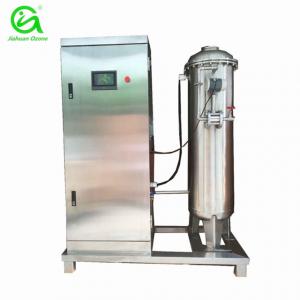

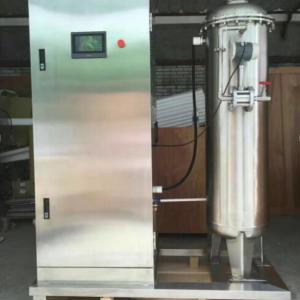
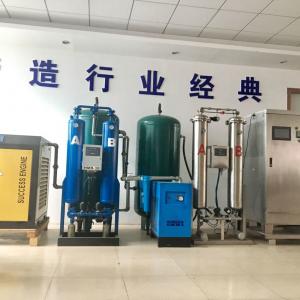
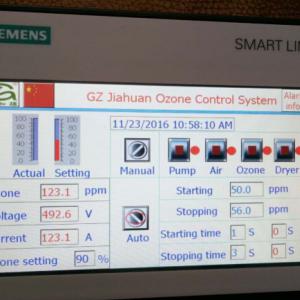
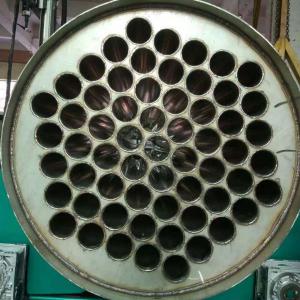
 China
China